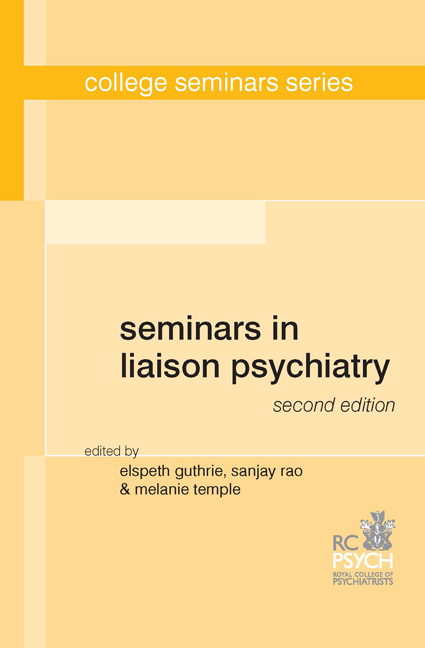Book contents
- Frontmatter
- Contents
- Abbreviations
- List of boxes, tables and figures
- List of contributors
- 1 Basic skills and competencies in liaison psychiatry
- 2 The liaison psychiatry curriculum
- 3 Classification and diagnosis
- 4 Capacity and consent
- 5 Psychological reaction to physical illness
- 6 Medically unexplained symptoms
- 7 Alcohol and substance use in the general hospital
- 8 Accident and emergency psychiatry and self-harm
- 9 Perinatal psychiatry
- 10 General medicine and its specialties
- 11 Liaison psychiatry and surgery
- 12 Neuropsychiatry for liaison psychiatrists
- 13 Psycho-oncology
- 14 Palliative care psychiatry
- 15 Sleep disorders
- 16 Weight- and eating-related issues in liaison psychiatry
- 17 Disaster management
- 18 Liaison psychiatry and older people
- 19 Paediatric liaison psychiatry
- 20 Primary care and management of long-term conditions
- 21 Occupational medicine
- 22 HIV and liaison psychiatry
- 23 Sexual dysfunction
- 24 Psychopharmacology in the medically ill
- 25 Psychological treatments in liaison psychiatry
- 26 Research, audit and rating scales
- 27 Service models
- 28 Developing liaison psychiatry services
- 29 Multiple choice questions and extended matching items
- Appendix 1 Specific competencies
- Appendix 2 Learning objectives with assessment guidance
- Index
Appendix 2 - Learning objectives with assessment guidance
- Frontmatter
- Contents
- Abbreviations
- List of boxes, tables and figures
- List of contributors
- 1 Basic skills and competencies in liaison psychiatry
- 2 The liaison psychiatry curriculum
- 3 Classification and diagnosis
- 4 Capacity and consent
- 5 Psychological reaction to physical illness
- 6 Medically unexplained symptoms
- 7 Alcohol and substance use in the general hospital
- 8 Accident and emergency psychiatry and self-harm
- 9 Perinatal psychiatry
- 10 General medicine and its specialties
- 11 Liaison psychiatry and surgery
- 12 Neuropsychiatry for liaison psychiatrists
- 13 Psycho-oncology
- 14 Palliative care psychiatry
- 15 Sleep disorders
- 16 Weight- and eating-related issues in liaison psychiatry
- 17 Disaster management
- 18 Liaison psychiatry and older people
- 19 Paediatric liaison psychiatry
- 20 Primary care and management of long-term conditions
- 21 Occupational medicine
- 22 HIV and liaison psychiatry
- 23 Sexual dysfunction
- 24 Psychopharmacology in the medically ill
- 25 Psychological treatments in liaison psychiatry
- 26 Research, audit and rating scales
- 27 Service models
- 28 Developing liaison psychiatry services
- 29 Multiple choice questions and extended matching items
- Appendix 1 Specific competencies
- Appendix 2 Learning objectives with assessment guidance
- Index
Summary
Biopsychosocial assessment of patients
Carry out a full biopsychosocial assessment of patients, in medical and surgical settings, with physical health problems, physical symptoms and mental health symptoms, impaired mental well-being or psychological distress, including:
• systematic documentation of the chronology of the patient's medical history, including use of timelines
• working with other clinical members of the liaison team
• know the epidemiology and common presentations of psychological problems in medical and surgical settings
• use of appropriate questionnaires in medical & surgical settings and recognise their limitations.
Guidance
The trainee should be observed interviewing a patient who is not previously known to them. This competency will usually be assessed using an Assessed Clinical Encounter (ACE); however, subcomponents may be assessed using a mini-ACE (e.g. in the context of a patient review).
Construct
The trainee should be able to take a history in a physically ill patient or in a patient with medically unexplained symptoms, exploring aspects such as previous medical problems, family illness and associated life events or ongoing stressors. Trainees should focus on the importance of timelines and illness chronology, as well as exploring the patient's understanding of their illness. Trainees should utilise the full range of available information, such as patient notes, informants, carers and staff on the ward. They should also be able to suggest, initiate and interpret appropriate investigations, including physical investigations and collecting corroborative information.
Mental state examination
Carry out a basic mental state examination identifying specifically:
• mood
• psychosis
• delirium
• insight
• understanding.
Guidance
This could be done with a new patient or during a ward review, most commonly using a mini-ACE. Several workplace-based assessments will be required to cover the range and depth of psychopathology.
Construct
The trainee should be able fully to differentiate between overvalued ideas, delusions, illusions and hallucinations, and explore the patient's health beliefs, expectations and understanding. The trainee should be able to diagnose delirium (acute confusional state), using appropriate history-taking and examination, including cognitive testing. Trainees should explore all perceptual areas and use appropriate questions in order to determine mood disturbance in physically ill patients.
Capacity
Be able to determine capacity, based on an understanding of the concepts.
- Type
- Chapter
- Information
- Seminars in Liaison Psychiatry , pp. 490 - 494Publisher: Royal College of PsychiatristsFirst published in: 2017



